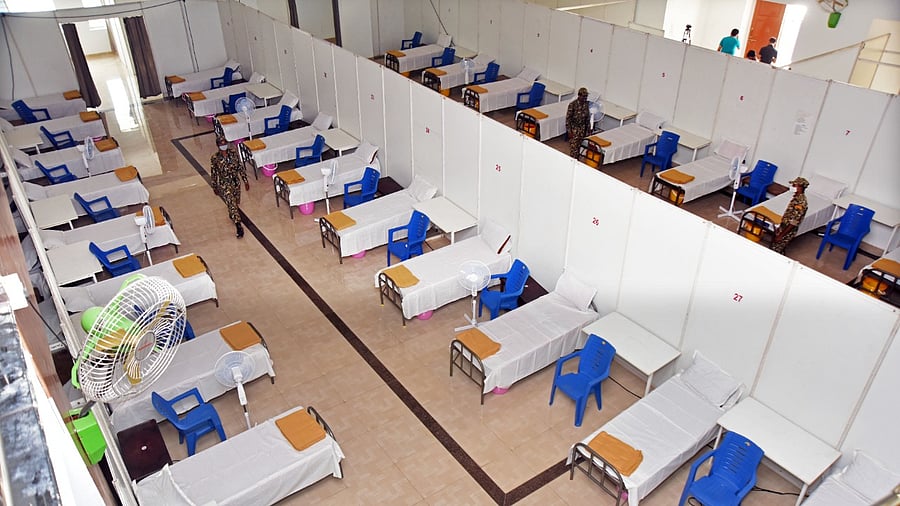
In a stark example of the mishandling of the pandemic, the 14 Covid Care Centres opened by the BBMP across the city are becoming white elephants.
While thousands of seriously ill patients desperately need oxygenated, ICU and HDU beds in hospitals during the second wave, the civic body spent taxpayers' money on setting up the CCCs for asymptomatic and mildly symptomatic sufferers. The results are there for all to see.
At a time when hospitals are overwhelmed with patients, the average occupancy at the CCCs hasn't crossed 30 per cent. At least three of them have just one patient each. As of 5 pm, May 8, only one Covid patient each is under treatment at the 100-bedded CCC at the Koramangala Indoor Stadium, the 50-bedded Vintage Blossom CCC in Bommanahalli and the 70-bedded CCC in Adugodi.
These numbers are in stark contrast to the 20,000 plus coronavirus infections being reported in the city every day.
The CCCs, according to the BBMP, are for people who do not have separate toilet or isolation facilities at home. Doctors and paramedics are posted there to monitor the patients.
It's not that the CCCs were never useful. During the first wave of the pandemic last year, these units were optimally utilised and had helped bring the infections down. But the second wave has been completely different. A large number of patients are taking seriously ill, requiring oxygen support or intensive care. Put simply, the key to containing the pandemic lay in ramping up oxygen supply and creating more beds in dedicated hospitals. This trend was clear when the second wave hit Maharashtra in March.
Shivajinagar MLA Rizwan Arshad said the BBMP had been "caught napping" during the second wave. "Officials failed to anticipate the situation and plan accordingly. It is not the CCCs that our people need now but oxygen, ventilators, ICU and HDU beds," he told DH.
Arshad said that had the BBMP studied the second wave in other countries or at least in Maharashtra, it would have noticed the trend. "The failure to do so is the reason for the poor occupancy at these Covid centres on which the BBMP has spent a fortune," he said.
BBMP Chief Commissioner Gaurav Gupta defended the decision to set up the CCCs. "During the first wave, panic-stricken people thronged these centres in large numbers. But many have realised now that mild symptoms can be treated with better care and doctor consultation by staying under home isolation," he said.
Gupta argued that the BBMP had decided to decentralise the CCCs at the zonal level after noticing this trend among patients. There is, however, a flip side to it. Patients under home isolation are infecting entire families but are not willing to get admitted to the CCCs.
Poor triaging
In Arshad's opinion, this problem wouldn't have arisen if patients were triaged properly. The BBMP encouraged people to stay under home isolation but failed to check their dwellings: whether or not patients have separate toilets. "The BBMP didn't keep watch. This has resulted in entire families being infected," the Congress legislator said.
Gupta acknowledged the problem. "The exponential rise in fresh infections has made it increasingly difficult to monitor every patient physically. Still, we are doing teleconsultation to check patients' health regularly."
Citizens dispute the teleconsultation claim. Many social media users have pointed out that they were never telephoned by any governmental agency during their home isolation period.
Taking note of the poor occupancy at the CCCs and why patients are shunning them, the civic body is now setting up oxygenated beds there in order to reduce the load on hospitals. As of Saturday, out of the 2,088 beds available at these Covid Care Centres, 439 beds were converted into oxygenated beds.
